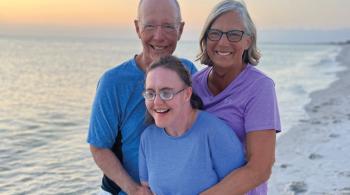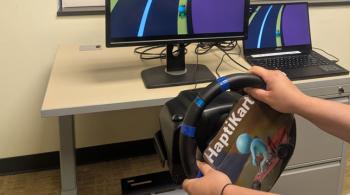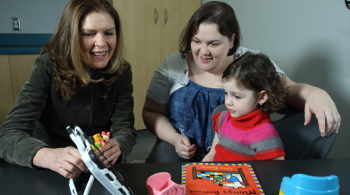BALTIMORE, MAY 25, 2021 — Children with autism spectrum disorder (ASD) were more likely to be diagnosed more than a year later than their peers were if their biological parents were not together at the time of diagnosis, according to new research from Kennedy Krieger Institute. In contrast, children with ASD whose biological parents were together were diagnosed about one year and four months earlier.
“Delays in autism diagnoses are a major problem, as they delay early intervention,” said the study’s author, Dr. Luke Kalb, Director of the Informatics Program at Kennedy Krieger’s Center for Autism and Related Disorders. “The gap in age at diagnosis across these groups was surprising. I was especially surprised to see we were the first study to report this finding, which is a major disparity in the autism community.”
Multiple factors could cause a delay in diagnosis when parents are not together, including family discord, mental health symptoms, difficulties that single parents face when coordinating services, or a family’s lack of support for daily activities, said Dr. Kalb, who added that more research is needed to determine the best way to support families.
“This study suggests separated and divorced families should receive additional supports during the diagnostic journey,” Dr. Kalb said. “Navigating the healthcare system is both complex and confusing. Providing these families with help can improve the long-term outcomes for the child, family, and community.”
The study, which was funded in part by the National Institutes of Health, looked at 561 children who came to Kennedy Krieger Institute’s Center for Autism and Related Disorders (CARD) from 2014 to 2020 for their first ASD evaluation. Their biological parents self-reported their relationship status as “together,” which meant married or living together but not married, or “not together,” which meant separated, divorced, or never married.
Sixty-nine percent of the parents reported being together and 31 percent reported not being together at the child’s first ASD evaluation. For children whose parents were together at the time of diagnosis, an ASD evaluation occurred around the age of 3; however, for children whose parents were not together, it occurred closer to age 4, or an average of 16 months later than a child whose parents were together. The research factored in adjustments for demographic, clinical, family and socioeconomic differences, but this disparity in diagnosis age remained.
Findings were published in the journal, Autism: The International Journal of Research and Practice.
Overall, the average age for a child in the U.S. to be diagnosed with ASD is 3, although children can be diagnosed as young as 18 months of age.
Dr. Kalb’s prior research has shown promising outcomes associated with care coordination services at Kennedy Krieger’s CARD. The center provides medical, psychological, speech/language, occupational, and social work services, and most of its patients come from Maryland.
About Kennedy Krieger Institute:
Kennedy Krieger Institute, an internationally known nonprofit organization located in the greater Baltimore-Washington, D.C., region, transforms the lives of more than 25,000 individuals a year through inpatient and outpatient medical, behavioral health and wellness therapies; home and community services; school-based programs; training and education for professionals; and advocacy. Kennedy Krieger provides a wide range of services for children, adolescents and adults with diseases, disorders and injuries that impact the nervous system, ranging from mild to severe. The Institute is home to a team of investigators who contribute to the understanding of how disorders develop, while at the same time pioneering new interventions and methods of early diagnosis, prevention and treatment. Visit KennedyKrieger.org for more information about Kennedy Krieger.
###















